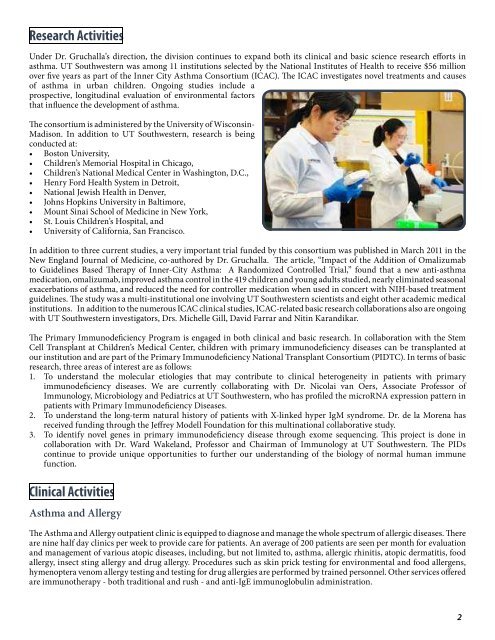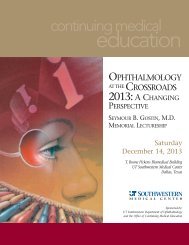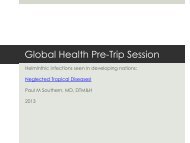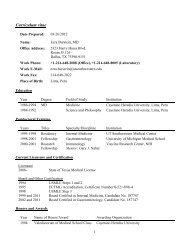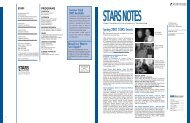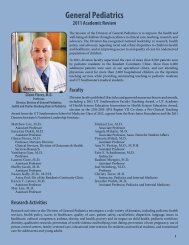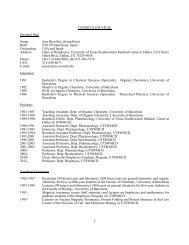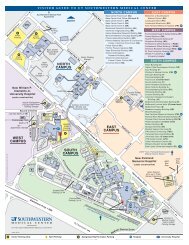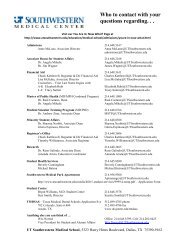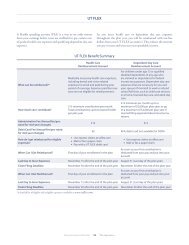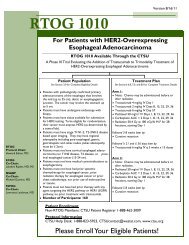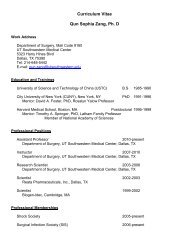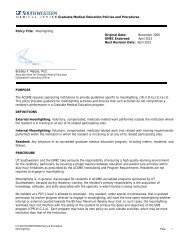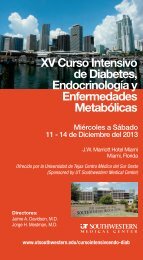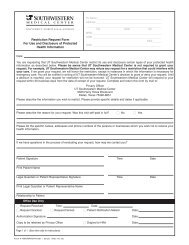Pediatric Allergy & Immunology - UT Southwestern
Pediatric Allergy & Immunology - UT Southwestern
Pediatric Allergy & Immunology - UT Southwestern
Create successful ePaper yourself
Turn your PDF publications into a flip-book with our unique Google optimized e-Paper software.
Research Activities<br />
Under Dr. Gruchalla’s direction, the division continues to expand both its clinical and basic science research efforts in<br />
asthma. <strong>UT</strong> <strong>Southwestern</strong> was among 11 institutions selected by the National Institutes of Health to receive $56 million<br />
over five years as part of the Inner City Asthma Consortium (ICAC). The ICAC investigates novel treatments and causes<br />
of asthma in urban children. Ongoing studies include a<br />
prospective, longitudinal evaluation of environmental factors<br />
that influence the development of asthma.<br />
The consortium is administered by the University of Wisconsin-<br />
Madison. In addition to <strong>UT</strong> <strong>Southwestern</strong>, research is being<br />
conducted at:<br />
• Boston University,<br />
• Children’s Memorial Hospital in Chicago,<br />
• Children’s National Medical Center in Washington, D.C.,<br />
• Henry Ford Health System in Detroit,<br />
• National Jewish Health in Denver,<br />
• Johns Hopkins University in Baltimore,<br />
• Mount Sinai School of Medicine in New York,<br />
• St. Louis Children’s Hospital, and<br />
• University of California, San Francisco.<br />
In addition to three current studies, a very important trial funded by this consortium was published in March 2011 in the<br />
New England Journal of Medicine, co-authored by Dr. Gruchalla. The article, “Impact of the Addition of Omalizumab<br />
to Guidelines Based Therapy of Inner-City Asthma: A Randomized Controlled Trial,” found that a new anti-asthma<br />
medication, omalizumab, improved asthma control in the 419 children and young adults studied, nearly eliminated seasonal<br />
exacerbations of asthma, and reduced the need for controller medication when used in concert with NIH-based treatment<br />
guidelines. The study was a multi-institutional one involving <strong>UT</strong> <strong>Southwestern</strong> scientists and eight other academic medical<br />
institutions. In addition to the numerous ICAC clinical studies, ICAC-related basic research collaborations also are ongoing<br />
with <strong>UT</strong> <strong>Southwestern</strong> investigators, Drs. Michelle Gill, David Farrar and Nitin Karandikar.<br />
The Primary Immunodeficiency Program is engaged in both clinical and basic research. In collaboration with the Stem<br />
Cell Transplant at Children’s Medical Center, children with primary immunodeficiency diseases can be transplanted at<br />
our institution and are part of the Primary Immunodeficiency National Transplant Consortium (PIDTC). In terms of basic<br />
research, three areas of interest are as follows:<br />
1. To understand the molecular etiologies that may contribute to clinical heterogeneity in patients with primary<br />
immunodeficiency diseases. We are currently collaborating with Dr. Nicolai van Oers, Associate Professor of<br />
<strong>Immunology</strong>, Microbiology and <strong>Pediatric</strong>s at <strong>UT</strong> <strong>Southwestern</strong>, who has profiled the microRNA expression pattern in<br />
patients with Primary Immunodeficiency Diseases.<br />
2. To understand the long-term natural history of patients with X-linked hyper IgM syndrome. Dr. de la Morena has<br />
received funding through the Jeffrey Modell Foundation for this multinational collaborative study.<br />
3. To identify novel genes in primary immunodeficiency disease through exome sequencing. This project is done in<br />
collaboration with Dr. Ward Wakeland, Professor and Chairman of <strong>Immunology</strong> at <strong>UT</strong> <strong>Southwestern</strong>. The PIDs<br />
continue to provide unique opportunities to further our understanding of the biology of normal human immune<br />
function.<br />
Clinical Activities<br />
Asthma and <strong>Allergy</strong><br />
The Asthma and <strong>Allergy</strong> outpatient clinic is equipped to diagnose and manage the whole spectrum of allergic diseases. There<br />
are nine half day clinics per week to provide care for patients. An average of 200 patients are seen per month for evaluation<br />
and management of various atopic diseases, including, but not limited to, asthma, allergic rhinitis, atopic dermatitis, food<br />
allergy, insect sting allergy and drug allergy. Procedures such as skin prick testing for environmental and food allergens,<br />
hymenoptera venom allergy testing and testing for drug allergies are performed by trained personnel. Other services offered<br />
are immunotherapy - both traditional and rush - and anti-IgE immunoglobulin administration.<br />
2<br />
A Pulmonary Function Lab is available for spirometry as well as exhaled nitric oxide studies for the evaluation and<br />
management of patients with asthma. Providers work closely with educators from the Asthma Education and Asthma<br />
Management programs to provide a comprehensive management strategy for patients with severe asthma. Special procedures<br />
such as drug challenges and food challenges are also performed in the outpatient clinic.<br />
A combined <strong>Allergy</strong>/<strong>Immunology</strong> and Otolaryngology sinus clinic (CASCADE) has been established to provide<br />
comprehensive care for patients with chronic sinusitis. One half-day clinic per month is offered at both the Dallas and<br />
Legacy campus. To facilitate care, patients who are seen in these clinics have a complete evaluation of allergen sensitization<br />
patterns and immunological system, as well as an otolaryngological evauluation in one setting.<br />
A multidisciplinary High Risk asthma clinic was established in the summer of 2011 to provide comprehensive asthma care<br />
to patients with severe asthma and other co-morbid conditions. Two half-day clinics are offered at the Dallas campus where<br />
patients are evaluated by multiple providers including an allergist, pulmonologist, nutritionist, psychologist and asthma<br />
educators to provide comprehensive asthma care and education.<br />
An active inpatient consult service is available for evaluation of patients with allergic diseases. Consults are usually requested<br />
in cases of suspected drug-allergy, anaphylactic reactions and severe asthma.<br />
Food <strong>Allergy</strong><br />
In September of 2010, the Food <strong>Allergy</strong> Center (FAC) at Children’s, which is directed by Dr. Drew Bird, officially opened its<br />
doors. This multidisciplinary center, in association with <strong>UT</strong> <strong>Southwestern</strong>, is the only academically affiliated pediatric food<br />
allergy program in North Texas. As such, the Center provides comprehensive care for patients who have been diagnosed<br />
with food allergies and conducts research that is instrumental in developing treatments, therapies and, ultimately, a cure for<br />
food allergies. Its staff also works tirelessly throughout the region to educate parents, healthcare providers, school personnel<br />
and community stakeholders to help children and families navigate the many challenges associated with this complex<br />
health issue.<br />
In 2011, the FAC continued to expand its influence within North Texas. Highlights from the year include the following:<br />
Clinical Care<br />
• Nearly 1,000 clinic visits were conducted.<br />
• 134 food challenges were performed with assistance from Maria Crain,<br />
PNP. The food challenge process entails giving the child incremental<br />
doses of a particular food over one hour and monitoring the child for an<br />
additional period of time. If the child can tolerate a full serving of the<br />
potentially allergenic food without having an allergic reaction, the food<br />
may be introduced into the child’s diet.<br />
Research<br />
• A total of 12 children are currently enrolled in a peanut oral immunotherapy<br />
trial aimed at understanding how the immune system develops tolerance to<br />
peanut in peanut allergic children receiving therapy.<br />
• Two multi-center trials examining the safety of giving the flu vaccine to a<br />
child with an egg allergy. The influenza vaccine contains a small amount of<br />
egg protein, and, as such, is administered cautiously to children with egg<br />
allergies.<br />
• Investigating changes in the quality of life for families dealing with food<br />
Dr. Drew Bird<br />
Director, Food <strong>Allergy</strong> Center<br />
allergies who attend instructional cooking classes. This study seeks to better understand how cooking classes offered<br />
through our Center by a registered dietitian improve the quality of life for children affected by food allergies.<br />
• More than 100 families have participated in our interactive nut identification quiz. The goal of this study is to provide<br />
insight into the ability of those with tree nut allergies to accurately identify the nuts to which they are allergic, as well<br />
as those to which they are not.<br />
Advocacy and Education<br />
• One of the first overnight camps specifically for children with food allergies was hosted at Camp Sweeney in Gainesville,<br />
Texas. Thirty-five children attended camp where safe meals were prepared avoiding a cumulative total of more than 30<br />
different allergens.<br />
• The second annual Food <strong>Allergy</strong> Collaborative hosted Wesley Burks, M.D., Kiser-Arena Professor and Chief of the<br />
Division of <strong>Pediatric</strong> <strong>Allergy</strong> and <strong>Immunology</strong> at Duke University Medical Center in Durham, North Carolina, and an<br />
3


